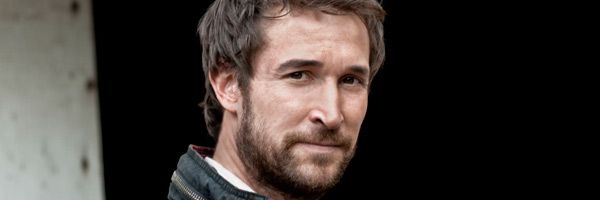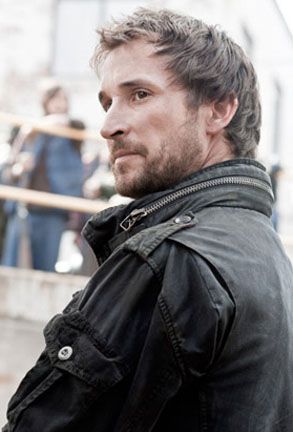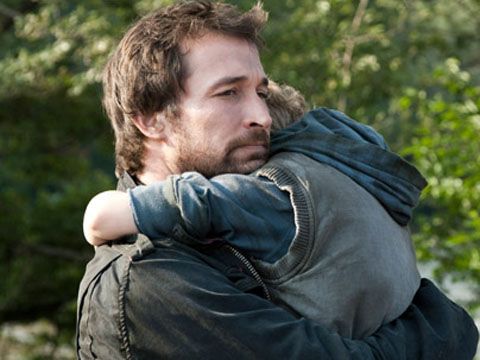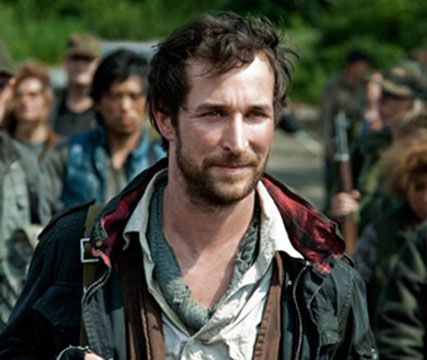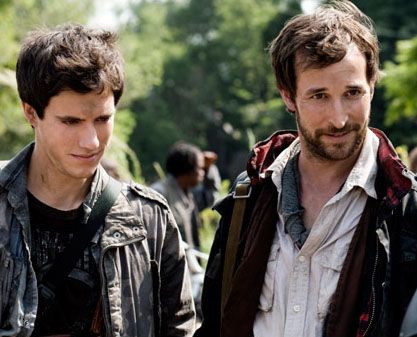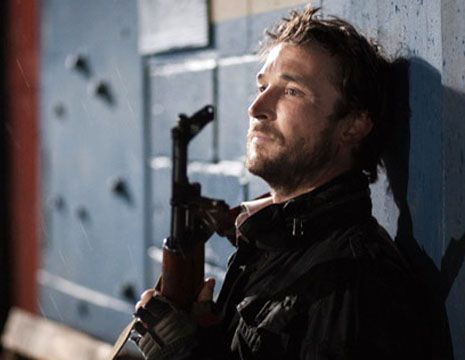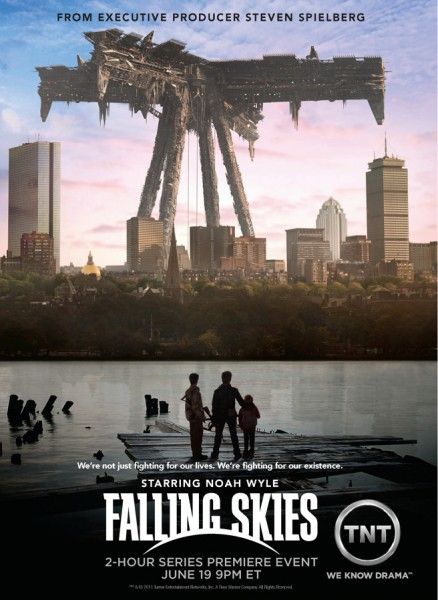On the new alien drama Falling Skies, from DreamWorks Television and executive producer Steven Spielberg, actor Noah Wyle plays Tom Mason, a history professor who never imagined that he would one day be waging war against an occupying force from another world. With his wife now dead and his middle son Ben (Connor Jessup) captured by the alien invaders, it’s up to Tom to protect his oldest son Hal (Drew Roy) and his youngest son Matt (Maxim Knight), despite having only an academic understanding of military history. Even though Tom proves himself a strong leader, he is determined to find and rescue his son from captivity, no matter what it takes.
At a press day for the television series, Collider sat down with Noah Wyle for this exclusive interview, in which he talked about getting this series through his long-term relationship with TNT, the nearly 20 years he’s had the good fortune of working with Steven Spielberg, signing on for this role so that he could impress his 8-year-old son, doing a show of this type on a television budget, how pleased he was when he saw the look of the aliens, and how incredibly gratifying it is to have such support from the network, so early on. Check out what he had to say after the jump:
Question: How did you get involved with Falling Skies? Was it something they came to you about?
NOAH WYLE: It was. Over the last six or seven years, I’ve built up a really nice relationship with TNT, through all the Librarian movies that we’ve made, and they syndicate E.R. So, I’ve gotten close with Michael Wright (at TNT), who has been very generous about showing me all the different pilot scripts, over the years, that he was putting into production, and this one came out, right at the time when I was getting the serious itch to go back to work.
Was it a big decision to return to episodic television, or was it just really about this particular project for you?
WYLE: It’s just about work. It’s just when I’m working, or when I’m not working. Working can be stage work, film work, TV work. It’s all the same. One of the more attractive aspects of doing a cable show is the 10-episode season, as opposed to a 24-episode season, so you’re only in bed for that character, half the time of what I usually am. But, this one had a lot going for it. With any project, but especially in television, I always try to look at where the character is starting from and where he’s going to end up, and try to find the biggest arc that makes it the most exciting to play. I liked the idea of trying to take a guy who was basically an academic and turning him into a warrior/soldier type. That seemed like a pretty good road to travel.
Do you enjoy getting to play the emotional and physical sides of this character?
WYLE: Yeah, that was one of the things we tried to pay close attention to. We didn’t want to have him be cowardly, by any stretch, as an academic, and at the same time, not have him lose some of the kinder aspects of his humanity and become more militarized. The idea was that there was Captain Weaver, the character that Will Patton plays – the hard-line, career military man – who has a very dogmatic approach to efficiency and discipline, and my guy from the realm of academia has much more of a professorial attitude towards teaching and empowering. Between those two ideologies, we form a synthesis into a new leader, which hasn’t really been seen much. It’s this idea of warrior statesman, like if you blended Jefferson and Washington together.
Are you normally a fan of the alien genre?
WYLE: No, but it’s not really from any stance on my part. When somebody first asked me whether I was a science fiction fan, I said, “No, but I’ve enjoyed it.” But, thinking it through, I would say that I probably used to be a bigger science fiction fan. I grew up on all the Star Wars movies and Star Trek, and all that. I just haven’t really kept current. I know that there have been a lot of comparisons made between our show and The Walking Dead and V, which I haven’t seen.
Was there a reason that you hadn’t done any sci-fi work, or was it just that those roles hadn’t come your way?
WYLE: It was more the roles not coming my way than anything. Science fiction, in its purest form, for me, it works the best when it’s being used as metaphor to look at something from a one step removed process, to give a little objectivity and insight into something that, if you were applying it on the face of it, we’d all be too close to. That’s what Gene Roddenberry did, better than anybody, with the original Star Trek shows. In ‘66, you could show a show about race relations, by making it Kligons and Vulcans, and not have to talk about black and white. You were talking black and white, but somehow it was a lot more palatable to be soon through another culture. I think this operates on that level. It’s got historical precedent. We draw a lot of allegory to the American Revolution, but it also has a lot of contemporary resonance too. There are many places in the world where you can find large occupying army that aren’t wanted on indigenous soil.
Do you feel that the show has found a good balance between telling these character stories and also having the alien aspect, to please both sci-fi and non-sci-fi fans?
WYLE: That’s the goal. Some of that is built in, from a couple different angles. Budgetarily, you have constraints about how much you can use of your post-production budget, per episode. You can show a little bit of aliens every week, or you can buy yourself three or four episodes worth of time, and get more bang for your buck on the fourth episode, if you’ve saved that post-production budget. So, we try to find other elements of conflict that we can dive into, that don’t involve the aliens and special effects, to such a high degree. I think those storytelling episodes are going to be more rewarding for people that aren’t part of the science fiction family.
Are you prepared for the sci-fi fans, and not only their complete devotion, but also their ability to let you know if they feel you get anything wrong?
WYLE: I’ve had a taste of it. Certainly, the medical community would call up, every 11:01 pm on Thursday night, to tell us all the medical inaccuracies we had made on E.R., so to a certain extent, I’m aware of it. I was amazed, when we made our announcement last year at Comic-Con and we showed a little bit of a trailer, just how closely people pay attention to detail, in this particular genre, and how they’re like, “Okay, show me how you’re different. Tell me how this is going to be worth my time because I’ve seen all these stories before, and you can’t possibly tell me, in a new way.” So, you have to win them over initially, but then, if you do, they are the most loyal following you could possibly hope for. Hopefully, we’ll please them.
What did Steven Spielberg bring to this project that makes it uniquely something that he’s involved with?
WYLE: It certainly dresses it up quite a bit, to have that pedigree. We benefit greatly from his body of work. I had the safety, security and knowledge of knowing that the aliens and the spaceships were going to look great on the show, and that I could focus on the acting of the characters, as being my responsibility. But, he was one of the executive producers on E.R., so we go back aways. I’ve had the great fortune of now having worked for him for almost 20 years, in one capacity or another, and I’m continually amazed at what a consummate storyteller he is. Many scripts come in and I think that they’re great, and then he makes his notes and makes them even better. Many cuts of episodes come in and I think they play fine, and then he makes his cut and they turn into something even better than that. He just has a way of refining and distilling storytelling to its basic elements and having them be really compelling.
Do you enjoy doing this kind of physicality for a role? Did carrying and using a gun come easy for you, or was that something you had to get used to?
WYLE: Well, I grew up playing cowboys and Indians, and gangster, in my backyard like other kids, so there was interest, if not aptitude. And, I have an 8-year-old son, so when I had all the different pilot scripts that TNT was going to put into production that year, I put it to him and said, “Do you want to see your dad be a lawyer, or do you want to see him be a police detective, or do you want to see him be an insurance adjustor, or do you want to see him be an alien fighter?” He said, “Stop right there!” So, it was really to get some street cred with my 8-year-old son that I did this show.
Did anything particularly surprise you about this character, by the end of the season? Did anything come up that you didn’t expect?
WYLE: Well, yeah, but they were more the by-products of the nature of filming than anything else. We had a long period of time after we shot the pilot, before this committed to series, to craft those scripts and I was involved and given access, early on, to the writers’ room. I made a suggestion here and there, but really, when you start shooting, they become their own mutations. Certain themes that you think are going to be the key themes of the show fall flat sometimes, when you see them. Relationships that you think are more ancillary or off to the side suddenly have great resonance, and you want to beef those up and explore those a little bit more. So, as much as we had an outline, we were writing as we were going and chasing themes and characters that we thought were playing stronger than others. In the course of doing that, occasionally you have to redefine where your character is going, in any particular moment. Specifically, when we did the pilot, it was pretty clear that we were going to triangulate the storytelling through three characters, predominantly – my character, Will Patton’s character and Moon Bloodgood’s character. The idea was that she was the humanist as the doctor, he was the career militarist as the Marine, and I would vacillate between the two of them, given my background. I would see the necessity for the decisions he was making because of the practical concerns of the day, but at the same time, not coming from a military background and being professorial, he could have a bit more empathy and compassion for the civilians in the ranks. The learning curve was going back and forth between the two. But, very early on, we added this character Pope (Colin Cunningham), who was this motorcycle gang leader, which established the human threat in a different way. So, that triangle suddenly became more of a square. Trying to figure out how to pace it out with that new dynamic provided a new challenge.
Was it important to have those human conflicts to balance out the big bad of the aliens?
WYLE: Yeah, for budgetary reasons, and also because before the invasion takes place, there are plenty of lines of division drawn between humans, like race, age, sex and religion. Suddenly, by the introduction of an exterior threat, all of those get erased and we become this homogenous group of humans, now fighting this exterior threat. But, when that threat is taken off the table for a day, or even an hour, it’s interesting to see how quickly characters revert back to old paradigms and prejudices. I thought that was a really interesting way of telling the story. We say, “While this threat still exists, not all humans are on the same page. Some are more self-serving than others, some have other agendas, and some put their own personal survival above that of the group. There’s great storytelling and dramatic riches to mine, all through there.
What did you think when you first saw what the aliens would look like?
WYLE: That’s a good question. We didn’t really see what they looked like, through most of the shooting of the pilot. We saw some renderings and some drawings. By the time we were in the final week of production on the pilot, there were some digital mock-ups of a Skitter climbing a wall and how they would move, and that they were spider-like creatures, but the final design wasn’t done until they were in post-production on the pilot. When I watched the final cut, that was when I really saw them for the first time and I thought they looked great. They’re pretty creepy. I’m told that good science fiction writing often involves peeling the onion, layer by layer, and releasing new pieces of information about the character that the audience wasn’t quite aware of, that creates a completely different picture at the end than the one you think you’re going to get, and that’s very much what we did with this season. What we think the aliens are, what they want and what their hierarchy is turns out to be radically wrong, by the end of the season, and affords us an opportunity to then explore this other side of it in Season 2.
What’s it been like to work with the young actors – Drew Roy, Connor Jessup and Maxim Knight – playing your three sons?
WYLE: Well, it’s daunting to show up on set as the oldest cast member, for the first time in my career, especially playing the father of a 17-year-old who’s being played by a 24-year-old. You always know that that line of demarcation is out there, in your career, but you don’t really ever think it’s going to be thrust upon you as quickly as it is. Suddenly, I was there on set going, “Okay, so these are my boys? All right. I’ve arrived there.”
Did you spend time bonding with each other, so that you could form that relationship on screen?
WYLE: Yeah, although the character of my middle son, Ben, wasn’t really cast until after we filmed the pilot, so he wasn’t part of that initial bonding experience. I spent a lot of time with Drew and Maxim, who I did work with. And then, when we did go to series and I got to work more with Connor, who plays my middle son, and we went over and had a lot of family dinners at his family’s house. We spent a lot of time together, which is a lot easier to do when you’re shooting on location and you’re all sequestered away together.
In such an unpredictable business, is it nice to know that everybody is already so behind this show that there’s already talk of a Season 2?
WYLE: It’s incredibly gratifying to have such support from the network, so early on. It’s almost astonishing, given the gamble that TNT is making on this show. It’s such a stylistic departure for them, in terms of theme and content. To have them pledge as much to the marketing campaign as they have, and to realize that, while they rightly want to wait to see how it performs before they truly greenlight a Season 2, we can’t wait until mid-June to start staffing our show because then there won’t be anybody around to staff. We need to have a couple scripts in the pipeline, so that, when the greenlight comes, we can hit the ground running.
FALLING SKIES premieres on TNT on June 19th

